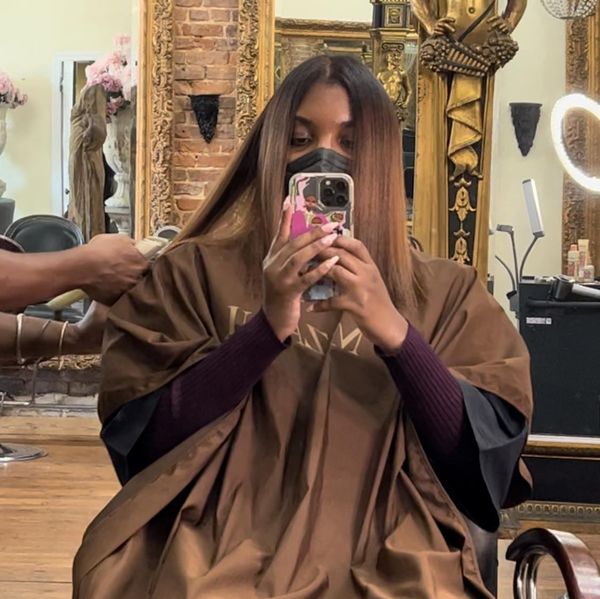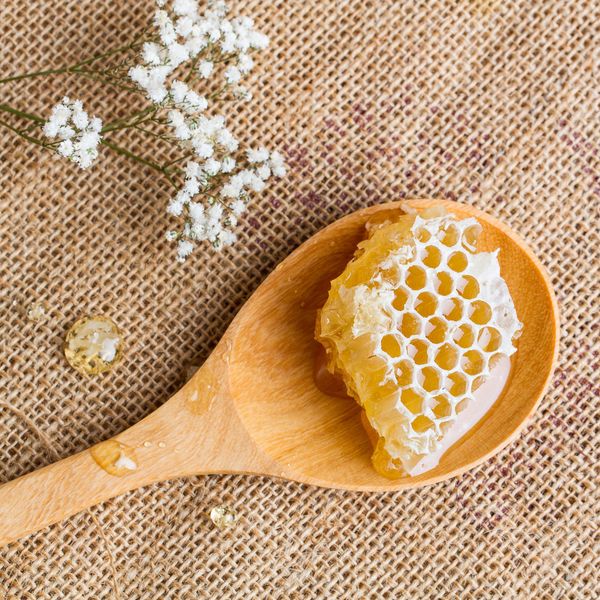
In case you ever end up being a contestant on Jeopardy and there's a category that's devoted to nothing but honey, there are some things you should know. Honey has been hailed as being a sweet form of medicine and a powerful energy booster, ever since the beginning of time.
In order to make a pound of honey, bees must get nectar from over two million flowers. Each bee? It only makes one-twelfth of a teaspoon of honey in its lifetime. It's also reportedly the only kind of food that doesn't come with an expiration date. Not only that but honey is the only food that's produced by insects, and it's the only food that produces pinocembrin (an antibiotic that improves how your brain functions). Some of honey's health benefits include its ability to lower blood pressure, improve cholesterol levels and relieve coughing.
Yeah, honey is all kinds of dope. So, the next time you go to the store to pick up a jar of honey, get two. One for eating (local raw honey is best) and another for medicinal and beauty purposes. Which one is best for that? Manuka honey. Due to all of the antibacterial properties that this kind of honey has, it's great at quickly healing wounds, fighting tooth decay and healing a sore throat. Some studies reveal that manuka honey is even great at treating symptoms related to cystic fibrosis.
From a beauty standpoint, I've got 10 solid reasons why—although it's a little bit on the pricey side—manuka honey is definitely one of the best natural beauty products there is. (For the record, raw honey works well too. I'm going with manuka honey because it's the 2.0 of all honey types.)
1.Skin Moisturizer
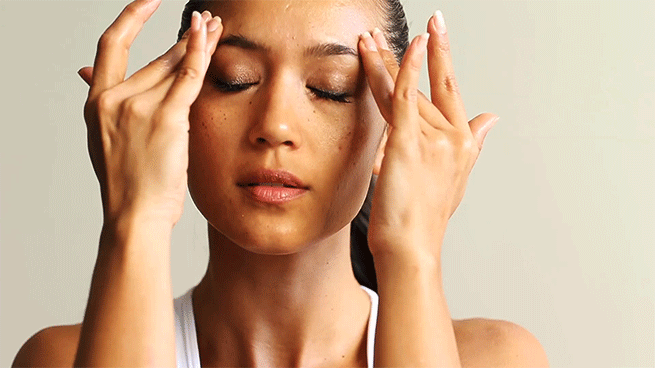
Because honey has such a low pH balance to it, it's got the ability to remove all sorts of bacteria from your skin. As far as manuka honey is concerned, the high amount of antioxidants that's in it helps to nourish your skin. Although this kind of honey is powerful, it's also gentle enough to use on sensitive skin. If you use it on your face, after a week's time, your skin's texture will become noticeably smoother, all without clogging your pores in the process.
Some women simply apply a layer of manuka honey onto their clean damp skin, let it sit for five minutes and then rinse it off (then follow that up with adding a little sweet almond oil to their face before turning in every night). Or, if you'd prefer to make some DIY manuka body butter, click here to learn how.
2.Exfoliant
Something else that honey contains are amino acids which is why it's so good for your skin. Manuka honey is especially beneficial because it's a type of honey that contains a powerful antibacterial property known as methylglyoxal. The combination of the acids and methylglyoxal is what makes this honey an effective-yet-gentle type of exfoliant.
One way to get the most out of manuka honey is to make an exfoliating face mask. All you need to do is combine half of a mashed ripe banana with two tablespoons of manuka honey and half a teaspoon of ground cinnamon (you can also swap out the cinnamon for a teaspoon of baking soda if you'd like; it's also a really good exfoliant). Mix everything together, apply it to your clean and damp face and let it sit for 15 minutes. Then rinse, first with warm water and then cool in order to seal your pores.
3.Acne Treatment
On average, our body is made up of five million pores with 20,000 of them on our face. Each pore contains a follicle that has a hair and sebum (naturally-produced oil) in it. Too much oil, dead skin and/or bacteria in your pores can lead to an inflamed bump because the inflammation prevents the bacteria from escaping. Manuka honey is able to remove the bacteria and even slow down the pH balance surrounding your zits so that the healing process of your bumps speeds up.
All you need to do is mix a tablespoon of manuka honey with a couple of drops of fresh lemon juice (it is an astringent that can help to prevent acne scars) and five drops of lavender essential oil (it removes bacteria while soothing your skin).
Bonus Tip: Manuka honey is a fabulous eczema remedy too. There are many clinical studies to support the fact that it brings instant relief to dry, cracked and oozing skin. If you want to DIY some eczema cream, Dr. Axe has a cool recipe that's easy to make.
4.Acne Scar Fader
Technically, pimples are inflamed lesions that turn into wounds once you pop them (which is why putting stuff like toothpaste on them really isn't the best idea). Wounds are torn skin tissue that eventually turns into a scab and, usually a scar after that. An acne scar specifically happens when our body produces too much collagen in the effort to heal the wound; this leads to raised skin and discoloration.
If you apply a dab of manuka honey and sweet almond oil directly onto your acne scars, the properties in the honey will soften the scar tissue and even out your skin tone. The key is to apply the solution daily in order to get maximum results.
5.Dark Eye Circle Lightener
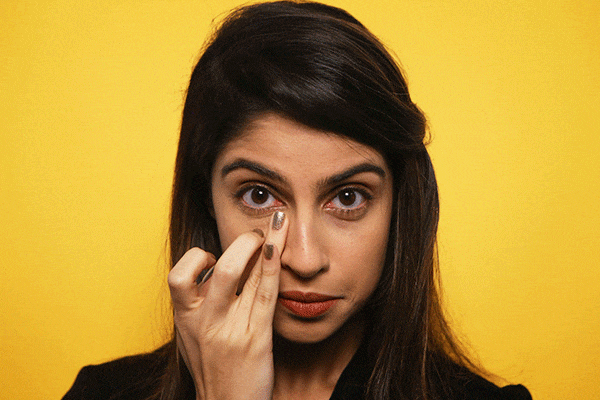
static-bebeautiful-in.unileverservices.com
There are alot of things that can lead to dark circles underneath your eyes—heredity, stress, allergies, sleep deprivation, too much sodium in your diet, excessive sun exposure and aging. Thanks to both the anti-inflammatory and bleaching properties in manuka honey, by applying a thin layer of it underneath your eyes (and letting it sit for 10 minutes or so before gently rinsing it off), it will increase blood circulation and boost collagen levels in that area. With this, you should start to see noticeable results in around 72 hours.
6.Hair Conditioner
Another awesome thing about honey is that it is a humectant (it pulls humidity from the air). This is a good thing to know if your hair is naturally dry. The high amounts of antioxidants and nutrients in manuka honey makes it the kind of ingredient that not only softens your hair but strengthens your hair follicles too.
If you'd like to give your locks a bit of a protein treatment while also keeping your tresses soft, combine three tablespoons of manuka honey with two tablespoons of avocado oil and one tablespoon of olive oil. Put everything into a microwave-safe bowl, use a whisk to make sure all of the ingredients are well-blended. Then zap the mixture in the microwave for 10 seconds and apply it to your hair, right after you've shampooed it. Let the mixture sit for 25 minutes with a plastic cap on your head, then rinse thoroughly and style as usual.
7.Lip Soother
There are all sorts of things that cause chapped lips. Although dehydration is probably the most obvious, humidity, sun rays and licking your lips too much (partly due to the bacteria that's in your saliva) can do it too. Since manuka honey is scientifically-proven to speed up the wound healing process (so much in fact that it's FDA-approved to do so) and tissue regeneration, that's why it does such a wonderful job at soothing and healing your lips.
If you want to make your own lip balm (complete with lavender and coconut oil), click here for the instructions. (You can also click here to buy some empty lip balm containers and here to purchase some small tin jars, if you'd prefer.)
8.Razor Bump Remover
Have you ever wondered what exactly causes a razor bump, it's this—whenever we cut our body hair, sometimes it tries to curl back and enter into the same pore; this is what results in an ingrown hair. This, combined with the dead skill cells that we're constantly shedding, can create quite the nuisance. The antibacterial properties in manuka honey is able to reduce the inflammation that razor bumps cause and remove the dead skin cells that are clogging up your pores.
The best way to use manuka honey to treat your razor bumps is to apply a thin coat of the honey directly on the bumps. Let the honey sit for 10 minutes and then rinse the oil while lightly massaging the bumps in an upward, circular motion. You should notice results within a day or so.
9.Nail Strengthener
Something that a lot of people are not aware of is how good honey is for your nails. Again, since it's got so many antibacterial properties in it, honey can help to heal toe fungus. Plus, it's awesome when it comes to restoring cracked cuticles and, it can strengthen your nails over time too.
Mixing a teaspoon of manuka honey, olive oil and apple cider vinegar is all you need to do. Apply the combo to your nails and cuticles, let it remain them for 15 minutes and rinse. If you do this twice a week, your nails will start to heal and your hands will become super soft as well.
10.Sleep Agent

Did you know that, according to a UCLA study on sleep deprivation, if you miss just one night of sound rest that it can age you? (Hey, that don't call it "beauty sleep" for nothin'!) That's why getting no less than seven hours of sleep is so important.
If you need a little help with, not only falling but staying asleep, don't turn in before swallowing one-half to one full teaspoon of honey (you can also put it into some caffeine-free herbal tea, if you'd prefer). What honey does is provide your liver with enough glycogen so that your brain is not "triggered" awake. In other words, honey literally gives you enough energy to stay sleeping. Plus, honey contains tryptophan; most of us know that it is an amino acid that is a powerful sleep aid too.
Yep, this is just one more reason to treat yourself and your beauty regimen to some manuka honey, just as soon as possible. I'm pretty sure you will absolutely love it—from head to toe.
Featured image by Getty Images
Want more stories like this? Sign up for our newsletter here and check out the related reads below:
7 Beauty Foods That Will Help You Glow From The Inside Out
The One French Beauty Product I Can't Live Without
What Is Double Cleansing & Should It Be On Your Beauty To-Do List
In A Bad Mood? These Foods Will Lift Your Spirits!
Originally published June 25, 2019
- How To Care For Stressed Out Skin - xoNecole: Women's Interest ... ›
- 7 Reasons To Use Colloidal Oatmeal On The Skin - xoNecole ... ›
- Check Out Some Of The Many Bee Pollen Benefits - xoNecole ›
- 6 Manuka Honey Benefits That Will Surprise You ›
- Manuka Honey: Health Benefits, Nutrients per Serving, Preparation ... ›
- Manuka Honey: Uses, Benefits, and More ›
- Manuka honey: Uses, qualities, wound care, and health benefits ›
- 30 Manuka Honey Health Benefits and Uses of Manuka Honey ›
- What Is Manuka Honey? Benefits and Uses of the Antibacterial ... ›
- Manuka Honey Benefits: How Manuka Honey Can Change Your Life ›
- Manuka Honey Benefits, Uses and Where to Buy It ›
- Manuka Honey Benefits ›
- Health Benefits of Manuka Honey as an Essential Constituent for ... ›
- Manuka Honey Benefits, Uses and How to Find the Best - Dr. Axe ›
- Manuka Honey: Medicinal Uses, Benefits, and Side Effects ›
- 7 Proven Benefits and Uses of Manuka Honey ›
Because We Are Still IT, Girl: It Girl 100 Returns
Last year, when our xoNecole team dropped our inaugural It Girl 100 honoree list, the world felt, ahem, a bit brighter.
It was March 2024, and we still had a Black woman as the Vice President of the United States. DEI rollbacks weren’t being tossed around like confetti. And more than 300,000 Black women were still gainfully employed in the workforce.
Though that was just nineteen months ago, things were different. Perhaps the world then felt more receptive to our light as Black women.
At the time, we launched It Girl 100 to spotlight the huge motion we were making as dope, GenZennial Black women leaving our mark on culture. The girls were on the rise, flourishing, drinking their water, minding their business, leading companies, and learning to do it all softly, in rest. We wanted to celebrate that momentum—because we love that for us.
So, we handpicked one hundred It Girls who embody that palpable It Factor moving through us as young Black women, the kind of motion lighting up the world both IRL and across the internet.
It Girl 100 became xoNecole’s most successful program, with the hashtag organically reaching more than forty million impressions on Instagram in just twenty-four hours. Yes, it caught on like wildfire because we celebrated some of the most brilliant and influential GenZennial women of color setting trends and shaping culture. But more than that, it resonated because the women we celebrated felt seen.
Many were already known in their industries for keeping this generation fly and lit, but rarely received recognition or flowers. It Girl 100 became a safe space to be uplifted, and for us as Black women to bask in what felt like an era of our brilliance, beauty, and boundless influence on full display.
And then, almost overnight, it was as if the rug was pulled from under us as Black women, as the It Girls of the world.
Our much-needed, much-deserved season of ease and soft living quickly metamorphosed into a time of self-preservation and survival. Our motion and economic progression seemed strategically slowed, our light under siege.
The air feels heavier now. The headlines colder. Our Black girl magic is being picked apart and politicized for simply existing.
With that climate shift, as we prepare to launch our second annual It Girl 100 honoree list, our team has had to dig deep on the purpose and intention behind this year’s list. Knowing the spirit of It Girl 100 is about motion, sauce, strides, and progression, how do we celebrate amid uncertainty and collective grief when the juice feels like it is being squeezed out of us?
As we wrestled with that question, we were reminded that this tension isn’t new. Black women have always had to find joy in the midst of struggle, to create light even in the darkest corners. We have carried the weight of scrutiny for generations, expected to be strong, to serve, to smile through the sting. But this moment feels different. It feels deeply personal.
We are living at the intersection of liberation and backlash. We are learning to take off our capes, to say no when we are tired, to embrace softness without apology.
And somehow, the world has found new ways to punish us for it.

In lifestyle, women like Kayla Nicole and Ayesha Curry have been ridiculed for daring to choose themselves. Tracee Ellis Ross was labeled bitter for speaking her truth about love. Meghan Markle, still, cannot breathe without critique.
In politics, Kamala Harris, Letitia James, and Jasmine Crockett are dragged through the mud for standing tall in rooms not built for them.
In sports, Angel Reese, Coco Gauff, and Taylor Townsend have been reminded that even excellence will not shield you from racism or judgment.

In business, visionaries like Diarrha N’Diaye-Mbaye and Melissa Butler are fighting to keep their dreams alive in an economy that too often forgets us first.
Even our icons, Beyoncé, Serena, and SZA, have faced criticism simply for evolving beyond the boxes society tried to keep them in.
From everyday women to cultural phenoms, the pattern is the same. Our light is being tested.

And yet, somehow, through it all, we are still showing up as that girl, and that deserves to be celebrated.
Because while the world debates our worth, we keep raising our value. And that proof is all around us.
This year alone, Naomi Osaka returned from motherhood and mental health challenges to reach the semifinals of the US Open. A’ja Wilson claimed another MVP, reminding us that beauty and dominance can coexist. Brandy and Monica are snatching our edges on tour. Kahlana Barfield Brown sold out her new line in the face of a retailer that had been canceled. And Melissa Butler’s company, The Lip Bar, is projecting a forty percent surge in sales.

We are no longer defining strength by how much pain we can endure. We are defining it by the unbreakable light we continue to radiate.
We are the women walking our daily steps and also continuing to run solid businesses. We are growing in love, taking solo trips, laughing until it hurts, raising babies and ideas, drinking our green juice, and praying our peace back into existence.
We are rediscovering the joy of rest and realizing that softness is not weakness, it is strategy.
And through it all, we continue to lift one another. Emma Grede is creating seats at the table. Valeisha Butterfield has started a fund for jobless Black women. Arian Simone is leading in media with fearless conviction. We are pouring into each other in ways the world rarely sees but always feels.

So yes, we are in the midst of societal warfare. Yes, we are being tested. Yes, we are facing economic strain, political targeting, and public scrutiny. But even war cannot dim a light that is divinely ours.
And we are still shining.
And we are still softening.
And we are still creating.
And we are still It.

That is the quiet magic of Black womanhood, our ability to hold both truth and triumph in the same breath, to say yes, and to life’s contradictions.
It is no coincidence that this year, as SheaMoisture embraces the message “Yes, And,” they stand beside us as partners in celebrating this class of It Girls. Because that phrase, those two simple words, capture the very essence of this moment.
Yes, we are tired. And we are still rising.
Yes, we are questioned. And we are the answer.
Yes, we are bruised. And we are still beautiful.

This year’s It Girl 100 is more than a list. It is a love letter to every Black woman who dares to live out loud in a world that would rather she whisper. This year’s class is living proof of “Yes, And,” women who are finding ways to thrive and to heal, to build and to rest, to lead and to love, all at once.
It is proof that our joy is not naive, our success not accidental. It is the reminder that our light has never needed permission.
So without further ado, we celebrate the It Girl 100 Class of 2025–2026.
We celebrate the millions of us who keep doing it with grace, grit, and glory.
Because despite it all, we still shine.
Because we are still her.
Because we are still IT, girl.
Meet all 100 women shaping culture in the It Girl 100 Class of 2025. View the complete list of honorees here.
Featured image by xoStaff
'You Both Are Going To Change': Tabitha & Chance Brown On Their New Body Collection & Successful Partnership
Tabitha and Chance Brown are the epitome of Black love. They've been married for 22 years after first meeting in middle school and share a beautiful blended family. The beloved couple is no stranger to talking about their journey to the altar and the ups and downs they've faced together on their show, Fridays with Tab & Chance. Now, they have taken the name Fridays and expanded it into a body collection.
The new collection, which dropped on November 14, features a body wash and a body lotion that complement their fragrances, Her Business and His Business. "We had such a huge success with the fragrance launch, and it’s because of our customers and fans," Tabitha shares in an exclusive interview with xoNecole.
"They asked for body products and we wanted to make sure we listened. But also layering fragrance begins with the body routine." The body wash is $33, and the body lotion is $35. Keep reading below to hear more about Tabitha and Chance's new collection, their body rituals, and what makes their partnership successful.
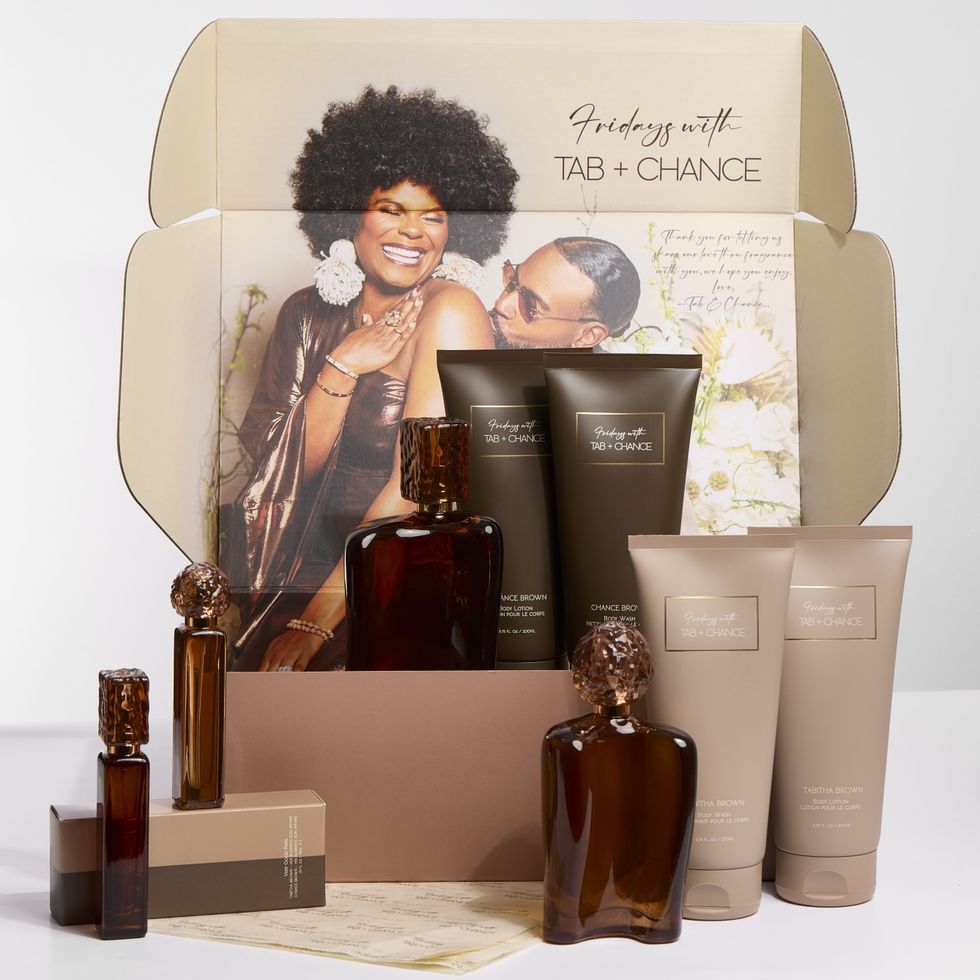
Fridays with Tab and Chance body collection
Marcus Owens
xoNecole: How did you come up with the scents for the collection?
Tabitha Brown: We love warm scents that make you feel sexy and loved. [We’re] both fans of gourmand [scents], including bergamot, vanilla, tonka and chocolate.
xoN: If you could describe your working relationship in one word, what would it be and why?
Tabitha: It's our first time building a product line together and our first time working with fragrance. So having patience with the process and each other has been the best way to build.
xoN: What is your body care ritual?
Tabitha: Exfoliate with a scrub a few times a week, but using a moisturizing body wash daily. After a shower, I spray a body mist that compliments what scent I am choosing for the day. Most times vanilla mist wins because it’s a perfect base for layering. I then hydrate [my] skin with lotion. Then, once dressed, I layer my favorite fragrance, Her Business, first and then His Business on top.
Chance: [I’m] way more simple. Just body wash and lotion and then my cologne and I’m good to go.
xoN: We enjoy watching you two together online, whose idea was it to start 'Fridays with Tab & Chance'?
Tabitha: It actually happened by accident. Back in 2018, my fans had just been asking about how we met, so we did a video answering questions one Friday and people in the comments [asked], will y’all do it again next Friday? And so we did and the next thing you know Fridays with Tab & Chance was born.
xoN: In what other ways do you plan to expand Fridays? Restart the podcast? TV show?
Tabitha: We are working on a lifestyle content show vs the traditional Fridays podcast. More to come soon.
xoN: You do many things together, but what would you say is your favorite quality time activity and why?
Tabitha: We are really simple. We love watching movies or TV series together on the couch or in bed. It’s really one of our favorite things to do together.
xoN: What is your favorite thing about the other person?
Tabitha: I love that he makes me feel safe and how hard he works to be an amazing father.
Chance: I love that she is crazy enough to pursue her wildest dreams.
xoN: What is the key to a successful partnership in business and personal?
Tabitha: The key is knowing that you both are going to change, and giving each other grace, patience, and understanding during those changes.
See more on tabandchance.com.
Feature image Marcus Owens





